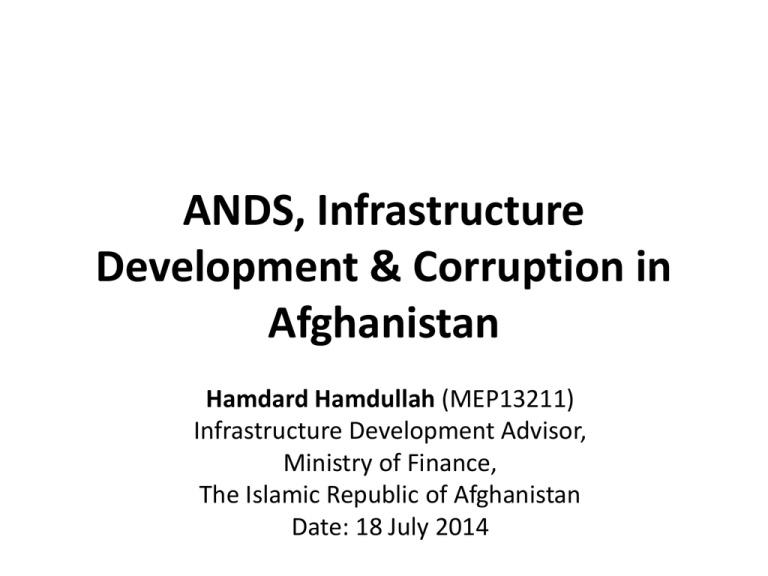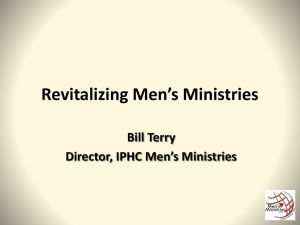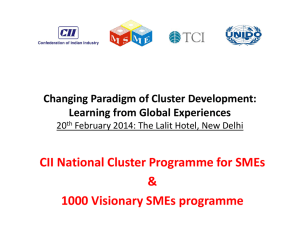Infrastructure Development and Policy Issues in Afghanistan
advertisement

ANDS, Infrastructure Development & Corruption in Afghanistan Hamdard Hamdullah (MEP13211) Infrastructure Development Advisor, Ministry of Finance, The Islamic Republic of Afghanistan Date: 18 July 2014 Afghanistan Development Framework Socio-Economic Development in the Short, Medium and Long term 2005-2020 15 Years Millennium Development Goals 2008-2013 5 Years National Development Strategy 2006-2010 5 Years Afghanistan Compact 2006-2010 3 Years Medium Term Fiscal Framework Annual 1 Year 1387 Budget 7/18/2014 By Hamdard Hamdullah, MEP13211 2 Importance of the ANDS • • • • Donors will not channel their funds through the Government’s core budget if there is no prioritized strategic plan or implementation arrangement. This means that the Government doesn’t have access to donor funded programs/projects and has no control over them. Importantly, the bilateral implementation of projects without consultation or approval from Government ministries/agencies has meant that a number of the programs/projects have been conducted repeatedly and inefficiently in different parts of the country which is a waste of time and resources. Many development priorities have to date been defined by donors and not by the Government of Afghanistan. 7/18/2014 By Hamdard Hamdullah, MEP13211 3 Importance of the ANDS … • • • In the absence of sectorial strategies, national programs and implementation arrangements, the Government has not been able to ensure that donor countries align their funding with the Government’s plans to increase effectiveness and efficiency. The Government has been continually criticized by the international and donor community of corruption, low capacity and not having a National Strategy in which priorities are identified, programs/projects defined, implementing agencies introduced and sources for implementation identified. This absence of a clear policy, vision and plan has created problems for the three branches of the Government; the judicial, constitutional and executive branches. Balance and coordination among the three branches depends on a national plan to provide specific guidance for all branches. 7/18/2014 By Hamdard Hamdullah, MEP13211 4 Our Vision for Afghanistan’s Future By the solar year 1400 (2020), Afghanistan will be: • A stable Islamic constitutional democracy at peace with itself and its neighbors, standing with full dignity in the international family. • A tolerant, united, and pluralist nation that honors its Islamic heritage and deep aspirations toward participation, justice, and equal rights for all. • A society of hope and prosperity based on a strong, private sectorled market economy, social equity, and environmental sustainability. 7/18/2014 By Hamdard Hamdullah, MEP13211 5 Afghanistan National Development Strategy The ANDS is a Millennium Development Goals (MDGs)based plan that serves as Afghanistan’s Poverty Reduction Strategy Paper (PRSP). It is underpinned by the principles, pillars and benchmarks of the Afghanistan Compact. ANDS 7/18/2014 By Hamdard Hamdullah, MEP13211 6 ANDS Institutional Structure President Cabinet Oversight Committee ANDS/JCMB Secretariats Governance Economic and Social Development Private sector development Social Protection Health Education Agriculture and rural development Infrastructure and national resources Good governance and rule of law Security security Under each of the above pillars, TWGs of the ministries and donors have come together to develop ANDS implementing benchmarks and monitor them. In order to achieve Afghanistan CompactBEnchmarks, they evaluate policies and strategies. Who were involved in the development process of the ANDS? • • • • • • The Government of Afghanistan: The president, cabinet, ministries, independent departments and commissions, municipalities, governors, provincial development committees, provincial departments of line ministries, district councils, embassies of Afghanistan in the other countries. The Government of Afghanistan: National Assembly (Upper and Lower Houses), provincial councils, elected councils at the district and village level. Civil society: local development councils, unions, organizations, political parties, NGOs, associations and private sector. Academics: universities, scientific and professional organizations and councils, science academy The International Community: United Nations, Embassies, Donors, NGOs, international private sectors, PRTs And also: minorities, Kuchis (nomads), disabled and war victims, Afghan residents and refugees outside of the country, national and international media 7/18/2014 By Hamdard Hamdullah, MEP13211 8 ANDS Participatory Process 17 Sector Strategie s 39 Ministry/Agency Strategies 34 Provincial Development Plans (PDPs) 345 District Development Plans (DDPs) 17500 Community Development Plans (CDPs) 7/18/2014 By Hamdard Hamdullah, MEP13211 9 More than 17000 afghans (46% women) participated in the Sub National Consultation process Public Awareness Campaign in 27 provinces during 2006 First Pilot Round of Sub National Consultations, March 2007 Second Round of Sub National Consultations, jun-Sep 2007 7/18/2014 By Hamdard Hamdullah, MEP13211 Third Round of Sub National Consultations, 10 Feb 2008 Role of the National Assembly in the Development Process of the ANDS • • • • Active participation of both male and female parliamentarians in the sub national consultation process of the ANDS Significant contribution in the consultative meetings on provincial development plans Significant involvement in the meetings on integrating the PDP priorities in the ministries strategies. Contribution and participation of NA members on the national budget 1387 which were based on the ANDS 7/18/2014 By Hamdard Hamdullah, MEP13211 11 Clusters for Achieving ANDS Results Overview Structural Composition • Clusters designed to enable strong leadership that facilitates ministries to deliver concrete results over the next 18-24 months • Clusters prioritize ANDS around key criteria - jobs and service delivery -- through bankable programs • Donors support government priorities at 80% of their budgets, improving coordination • Ministerial Clusters will operate at strategic (decision making) level • Cluster Working Level will include Deputy Ministers, Director Generals and STAs • Cluster Secretariat will be staffed by MoF/ANDS • Cluster Coordinating Committee will provide oversight and integration role Planning Process for Kabul March: Clusters define goals, strategy and key interventions against the stated criteria: • • • • Ability to deliver jobs, directly and indirectly Nationwide coverage Builds on existing interventions Ability to attract more investment April: Analyze bankable programs to determine: • Top up or scale-out of existing programs • Re-design of programs to meet criteria • Scale-down of poor performing or nonaligned programs • Outline of new programs to fill gaps May: Integrate plans, receive Cabinet and JCMB endorsement and deliver at Kabul Conference Cluster Planning Process February 1 Cluster Coordinators & Ministers Ministry Working Level Staff 2 3 March 4 1 3 4 2 3 4 Bankable Program Decision Meetings Validate Cluster Objectives & Goals Review Strategy & Interventions Review Cluster Objectives & Goals 2 3 Endorse Integrated Cluster Plan Review Cluster Plan Review of Bankable Program Analysis Prepare Strategy & Interventions docs Prepare Materials Explanation of Cluster process 1 Send Plan to Cabinet for Endorsement Prepare Bankable Program Analysis Donor Meetings 1 May Validate Strategy & Interventions Prepare Ministry & Sector Analysis Cluster Secretariat 2 April Present Cluster Vision, Strategy, Interventions Prepare Integrated Cluster Plan Present Bankable Programs & Outline Cluster Plan JCMB Review & Endorse at Kabul Conference 4 Bankable Program Decision Tree NO Has currently committed funds YES 3 PARTLY 1 YES 7/18/2014 YES 4 NO YES Terminate Program NO Re-Allocate Funds to Qualified Program Considered Viable Program NO Considered Viable Program Considered Viable Program Re-Design Program to Meet Criteria 2 NO NO Meets Cluster Criteria Funds cans be re-committed or re-allocated YES 2 YES 2 Program can be redesigned Can Scale Up in Volume Continue Program Allocate More Resources YES 3 YES 3 NO By Hamdard Hamdullah, MEP13211 (or Not Needed) Can Scale Out Regionally YES 4 NO 14 (or Not Needed) Government of Afghanistan Structure for ANDS Clusters Coordination President & Cabinet Joint Coordination and Monitoring Board Cluster Coordination Committee (CCC) (Chair Min. Zakhilwal) Cluster Coordinators CCC Secretariat (Director - DM Policy) Policy Directorate DM for Policy Office Support Strategic Implementation Directorate Civilian Technical Assistance Directorate Operations Directorate Agriculture & Rural Development Cluster [ ] Cluster Secretariat (2-4 ppl) 7/18/2014 Cluster Ministers (plus 1 DM & 1 TA per ministry) Human Resource Development Cluster [ ] Cluster Secretariat (2-4 ppl) Cluster Ministers (plus 1 DM & 1 TA per ministry) Infrastructure and Economic Development Cluster [ ] Cluster Secretariat (2-4 ppl) By Hamdard Hamdullah, MEP13211 Cluster Ministers (plus 1 DM & 1 TA per ministry) 15 Cluster 1 Core Cluster Participation (Coordinator) Cluster 1 Cluster 1 Ministers Secretariat (plus 1 DM (2-4 ppl) & 1 TA per ministry) Cluster Coordinator Ministry Support Secretariat Minister 1 Minister 2 Minister 3 Minister 4 Ministry 1 Deputy Minister Ministry 1 Senior Advisor Ministry 2 Deputy Minister Ministry 2 Senior Advisor Cluster Manager Senior Technical Advisor Drafter / Organizer • Ministerial participation • Strategic guidance • Oversight of process • Endorsement of results 7/18/2014 • Knowledge of Ministry • Programs and projects • Technical planning skills • Reach-in to Ministry • Preparation of Ministry plans within the Cluster By Hamdard Hamdullah, MEP13211 • Facilitation of planning • Background analysis • Objective technical support • Preparation of drafts • Deconflict and synch plans with other Clusters 16 Infrastructure Development There are four National Priority Programs in Infrastructure Development Cluster • NRRCP (Airports, Civil Aviation, Roads, Railway) • NEIEP (Mining and Extractive Industries) • NESP (HPPs, Renewable energy, Transmission Lines, Power generation and electricity import) • UMSP (urban development projects, construction of towns, urban roads, and canalizations) 7/18/2014 By Hamdard Hamdullah, MEP13211 17 Classification of External Assistance by ANDS Sectors (2011) 7/18/2014 By Hamdard Hamdullah, MEP13211 18 Clusters Priorities & Objectives (Proposed) Goal Statement: “The goal of the clusters is to increase collaboration between Ministries and to develop and implement a clear, prioritized agenda aimed at addressing the key development challenges of the sector.” (London paper on Economic Development) Agriculture and Rural Development Cluster Objectives Human Resource Development Cluster Objectives Infrastructure and Economic Development Cluster Objectives The GoA will build prosperous rural communities through focus on: The GoA will prepare Afghans for the labour market through focus on: The GoA will develop a business climate that enables private investment through focus on: 1. Improving access to water and irrigation 1. Increasing the number and quality of University Graduates 1. Increasing access to energy 2. Improving access to rural credit 2. Bridging gap between graduation and recruitment 2. Creating a modern transportation backbone 3. Improving applied research and technology transfer services for farmers & kuchis 3. Increasing number and quality of vocational education 3. Facilitating growth of business and trade 4. Improving access to rural energy 4. Utilizing public private partnerships in the provision of training 4. Preparing Afghanistan for large-scale investment in the extractive industries Overall Financing Envelope for the ANDS 1387-1391 (2008-2013) 1387 2008/09 US$m 1388 2009/10 US$m 1389 2010/11 US$m 1390 2011/12 US$m 1391 2012/13 US$m Total US$m Core + External Budget Funding Domestic Revenue 887 1,104 1,351 1,611 1,911 6,864 Total Assistance from Donors* 6,513 4,960 4,814 4,398 3,908 24,593 Total Funding* 7,400 6,064 6,165 6,009 5,819 31,457 Security 3219 2585 2679 2790 2906 14179 Infrastructure 1781 3093 3681 4180 4451 17185 Agriculture and Rural Development 829 921 916 909 912 4486 Education and Culture 742 893 980 1077 1181 4872 Good Governance and Rule of Law 374 558 640 685 728 2985 Health & Nutrition 325 465 530 563 595 2478 Economic Governance & PSD 237 215 230 244 260 1186 Social Protection 192 359 394 421 449 1815 Others (Sub Codes) 205 198 185 170 157 915 7,903 9,286 10,236 11,038 11,637 50,100 Budgeted Core + External Expenditure Total Expenditure * Based on discussions with donors and the 1386 (2007) financial review 7/18/2014 By Hamdard Hamdullah, MEP13211 20 Corruption & Infrastructure Factors facilitating corruption in infrastructure, by Level 7/18/2014 By Hamdard Hamdullah, MEP13211 21 7/18/2014 By Hamdard Hamdullah, MEP13211 22 Corruption vulnerabilities project cycle 7/18/2014 By Hamdard Hamdullah, MEP13211 23 Vulnerabilities to Corruption in Afghanistan’s Road Construction Sector 7/18/2014 By Hamdard Hamdullah, MEP13211 24 7/18/2014 By Hamdard Hamdullah, MEP13211 25






